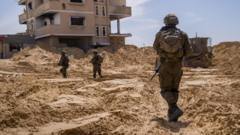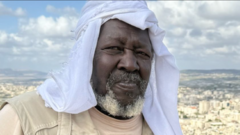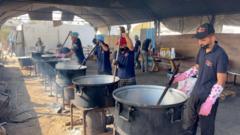The relentless siege imposed by Israel on Gaza has entered its third month, resulting in a dire humanitarian situation where children suffer from hunger and preventable diseases claim lives due to a lack of medical care. Health officials express their desperation as calls from patients seeking help continue to increase, highlighting the urgent need for humanitarian assistance.
Humanitarian Crisis Deepens in Gaza Amid Ongoing Siege

Humanitarian Crisis Deepens in Gaza Amid Ongoing Siege
As the blockade continues, Gaza faces acute shortages of essential supplies, leading to widespread suffering among children and patients.
It has been over 60 days since Israel halted all humanitarian aid to Gaza, leaving the enclave's population with no access to food, medicine, or fuel. Muneer Alboursh, director of Gaza’s health ministry, faces an increasing number of frantic calls from desperate doctors and patients alike, struggling to find solutions for treatable conditions without any available medications. The response is grim; in many cases, Alboursh admits, those patients do not survive.
Israel has justified its blockade as a necessary measure until Hamas releases hostages from the recently collapsed cease-fire. The Israeli government claims the blockade is lawful and that sufficient provisions are still within Gaza. However, many humanitarian organizations and European officials have labeled this perspective as a manipulation of aid for political purposes, asserting that such a blockade breaches international law.
The blockade's consequences are felt broadly across the lives of approximately two million people in Gaza, compounding the already harsh conditions. Residents have endured partial blockades since 2007 when Hamas took control, but the current total siege magnifies their struggles, pushing more people to the brink of despair and diminishing their hopes for relief.




















